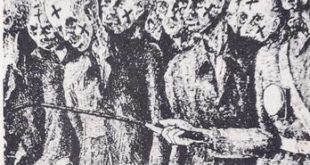IN Europe as in America, the leading democratic nations — Great Britain and France — faced the problems of the great depression. In those nations, too, the question arose: Could democracy survive, or would it give way to totalitarianism? Would the people turn instead to fascism or communism? Although Britain had a brief period of prosperity immediately after World War I, of all the world’s democracies, it was struck hardest and soonest by the depression. For Britain had a special problem. A highly industrialized country, it lived by its exports. It sold manufactured goods and coal to other countries and imported its food. Even before the war, Britain had begun to lose its markets. Other countries were making wool and cotton cloth, which was one of Britain’s most important exports. New fuels were developed that were replacing coal. More and more countries were using high tariffs to keep out foreign goods. After 1918, the situation became even worse. The fact that Britain had long been an industrial country was now working against it. Its machinery and manufacturing methods were old-fashioned and could not compete with the modern machinery and methods of other lands. Exports fell, factories shut down and millions of Britons were out of work. Britain had had unemployment insurance as early as 1911. Now the payments were increased and the unemployed went “on the dole,” as they called it. The government also provided old-age pensions and some medical and housing aid, but the people felt that the unemployment and other benefits were too small and they were dissatisfied. They began to turn to the Labour party. Up to this time, Britain’s strongest political parties had been the Conservative party and the Liberal party, with the Labour party a poor third. In 1922, the Labour party became second only …
Read More »The Meaning of Totalitarianism
So it happened that in many parts of the world people were living under a system of government that came to be called totalitarianism. There were differences in the governments of the totalitarian countries, but they were alike in certain important ways. In each of them, the government was controlled by one political party, usually under a dictator and no other political parties were allowed. The ruling party was not satisfied to control the government; its aim was total control of the life of its people. It controlled the courts and the armed forces, labour and industry, science and the arts. In some countries, it controlled religion completely; in others, religious groups were allowed to exist so long as they did not challenge the power of the government. To keep their strict control of the people, the totalitarian governments set up a secret police and totalitarian countries were often called “police states.” The people had no civil liberties and no part in the governing of the country. They had to obey and do as they were told. If they did not, they risked prison, concentration camp, torture and death. As totalitarianism spread widely over the world, men began to wonder what had made it possible. The reasons were not too difficult to find . The end of World War I had left many countries, especially those that had been defeated, divided and disorganized. Their weak governments could not solve the problems that faced them. This gave “strong men” the chance to take over the government. Another important reason was the great depression that began around 1929. Business seemed to come to a standstill. Unsold goods piled up in warehouses, while factories shut down and millions of people were thrown out of work. Hungry people were willing to listen to anyone …
Read More »

